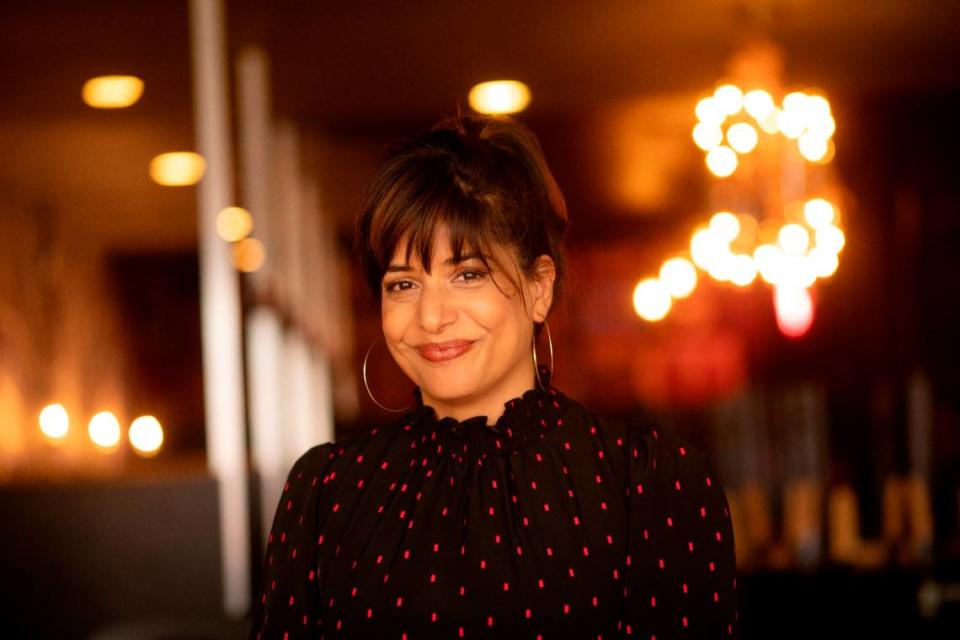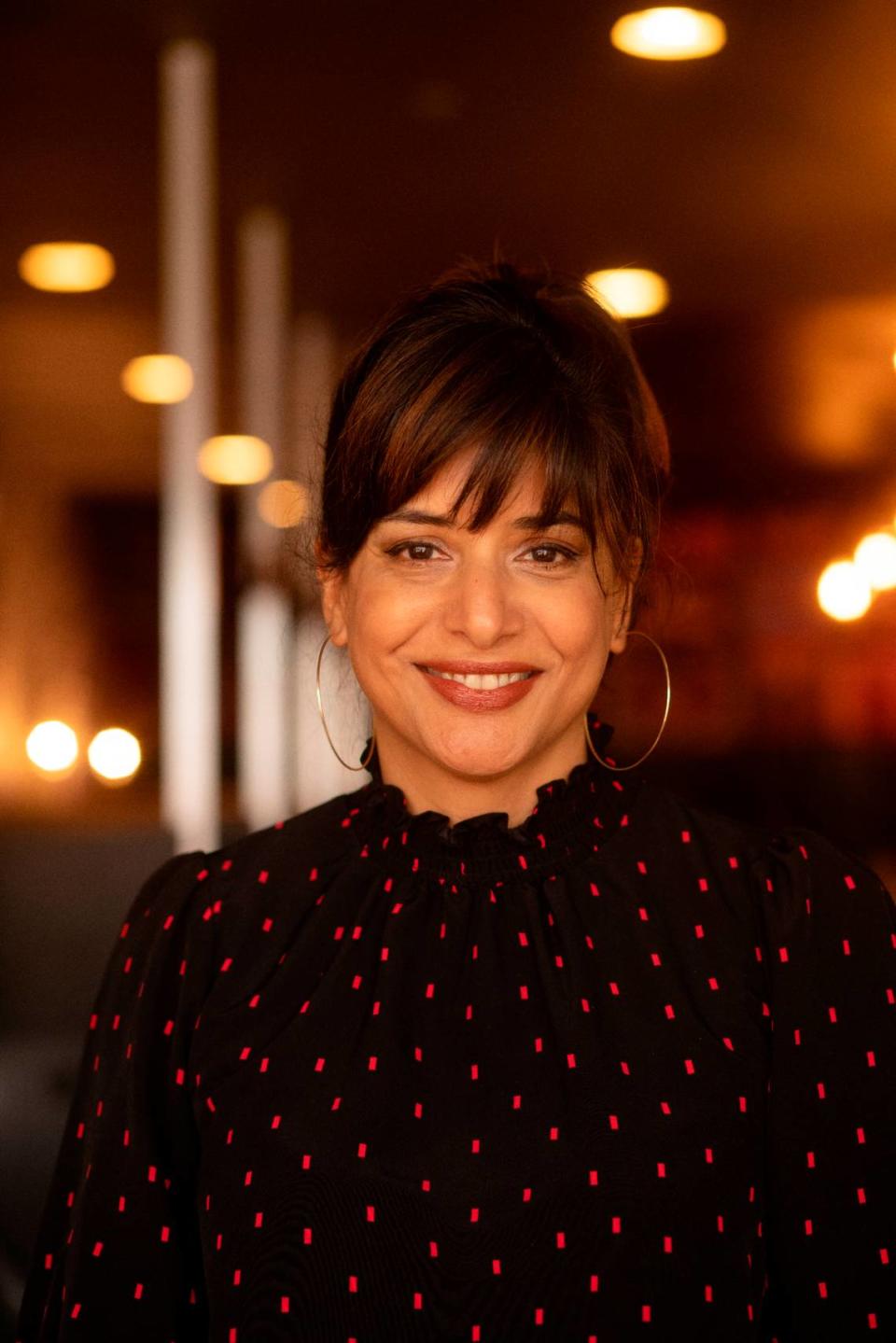Cheetie Kumar, owner of Raleigh’s Garland, finds her voice in the culinary industry
Chefs are well equipped to confront disaster.
A bite, a dish, a meal, it all begins in pieces, with a pound of flour or a crate of sweet potatoes or a bowl of basil cut into ribbons.
So in 2020, when disaster came for America’s kitchens, chefs wrote a prep list.
“When you put chefs together, we reverse-engineer everything,” said Cheetie Kumar, the James Beard-nominated chef and co-owner of Garland, a restaurant in Downtown Raleigh. “We make prep lists and get into the details, we break down a problem and make lists and then solve it. We’re ready for service at five o’clock.”
During the pandemic, with her Raleigh restaurant Garland shuttered, Kumar joined the national efforts of the Independent Restaurant Coalition, attempting to save the thousands of small American restaurants from ruin. It meant testifying before Congress, appearing on panels and making countless calls to state and federal lawmakers, making the case that it would take billions of dollars to save restaurants and their place in American culture.
Kumar did all this while figuring out how to save her own restaurant, reopening Garland first to takeout meal kits, then to a patio oasis built out of bamboo on a downtown sidewalk, and finally reopening her dining room, welcoming in the new normal of the day.
“The approach was very much like this: These are the goals or the people that we need to reach out to each day,” Kumar said. “I just kind of wanted to do something, because I felt really helpless and I’m not good at that feeling. If I see something wrong, I kind of want to fix it.”
For inspiring and delighting diners at her restaurant Garland since 2013, helping to create the modern North Carolina dining scene and the two years spent advocating and lobbying on behalf of an industry reeling from the COVID-19 pandemic, Cheetie Kumar is the News & Observer’s Tar Heel of the Month.
Chefs are interested in how the sausage is made, they’re used to building things in steps, in exactitude and timing, Kumar said. Legislation was just another recipe.
“And that’s the way the legislative process worked,” Kumar said. “You have to know exactly what you’re asking for, you have to know where it comes from you have to know who supports it, the people on both sides of the aisles, you have to know what it’s going to cost....And then you just have to be relentless.”
The Independent Restaurant Coalition estimated it would take $120 billion to address all the needs of small restaurants recovering from the impact of the pandemic. The eventual grant program, the Restaurant Revitalization fund, received $69 billion in application requests, but the fund itself only had $28 billion.
“The end result was we got a third of what we asked for, which hurt,” Kumar said. “But to do it all in a two-year span was pretty remarkable.”

Rock star chef
Kumar was born in Pennsylvania and spent eight of her earliest years in Chandigarh, India. She grew up in and attended high school in The Bronx, where her grades were great despite ditching class all the time, cutting out to read or visit the city’s museums. She eventually moved to Raleigh in her early 20s to pursue a music career.
After endless days on tour with the Birds of Avalon, her band with her husband and Garland co-owner Paul Siler, the couple opened Garland in 2013 as a restaurant to showcase Kumar’s self-taught culinary talent. They also own King’s, a music venue, and the bar, Neptune’s Parlor, next door. Both are temporarily closed.
Today, Garland remains one of Raleigh’s most exciting and beloved restaurants, with Kumar building menus and dishes grounded in seasonal North Carolina ingredients and flavors of South, East and West Asia. But while those flavors and dishes reflect certain cultures and countries, Kumar is sometimes disappointed when diners ask, “What kind of Indian restaurant doesn’t serve naan bread?” or asks for a bottle of soy sauce for a dish with rice.
“We’re a New American restaurant, which might bring to mind specific things for people, but that’s what we are,” Kumar said. “We represent the diversity that is America now, that’s what we are, we’re not really defined by any boundaries or culture.”
Earlier this month, Kumar was one of four North Carolina chefs nominated for the James Beard Best Chef: Southeast Award. It was the fifth year she had been at least a James Beard semifinalist. She was previously a finalist in 2020.
This year, the Southeast award went to fellow Triangle chef Ricky Moore of Saltbox Seafood Joint in Durham.
That awards night seemed to signal a new trajectory for North Carolina dining, with two other state restaurants taking home awards as well. Chai Pani, an Indian street food restaurant in Asheville, won for Outstanding Restaurant, and Curate, also of Asheville, won for Outstanding Hospitality, each national awards.
To Kumar, those medals and the types of chefs they went to meant North Carolina was stepping into a national culinary spotlight simply for being true to itself, both its traditions and its evolutions.
“It kind of really does cover the whole breadth of our food personality, it’s old, it’s rooted in local culture and local resources,” Kumar said. “You can’t put North Carolina in a box. It expresses itself, we express ourselves, in so many different flavors and so many different approaches.
“But ultimately what makes us great is loving where we are and loving where we cook, and loving to feed people and welcome them into our homes and into our businesses,” Kumar said. “Sort of like Southern hospitality, I think that we kind of own it right now.”
Kumar spoke with The News & Observer about her career and what she has learned along the way.
What did you want to be when you grew up?
I never really knew. I never had a clear desire, and I remember worrying about it. And I still worry about it. I had so many interests, nothing ever felt like The One Thing.
What achievement are you most proud of?
My marriage. Paul and I have been together for a really long time. We met when we were in our early 20s. And, you know, we’ve done so many things together. We’ve been through, like, three iterations of our life, so far. And we’ve worked together pretty much the whole time.
And if anybody has worked with their spouse, they know how hard that is. It’s not something I take for granted. It’s hard to even have a friendship that lasts that long. But then, when you have a marriage, that whole component, and business partners, and you know, house owners and travel companions and bandmates and creative partners.
It’s not really my achievement. It’s ours. But I’m proud that we have a better relationship than we ever have. And I feel like it’s been a very deliberate relationship. Our growth and evolution together has been very deliberate. And nothing like that sticks around in your life by accident.

How do you see your role in the Triangle’s food community?
I think that kind of changes all the time. Initially, when Garland first opened, I would have said, (it was) the voice of somebody who isn’t originally from here, but celebrates being here and brings a non-European perspective to our food scene. And, I think that’s still really valid.
But somehow, maybe I’ve taken that and expanded on it a little bit, become a little bit more active in the advocacy of just the restaurant industry. But really, what I want is to be more of an advocate for the food system in general.
What does leadership mean to you?
Well, leadership is a way of life. Leadership means being very honest about your own personal process, your own growth, your own vulnerabilities and shortcomings.
It’s about showing up and doing the things that you’re trying to lead people to do. It’s about being vocal. It’s about communicating positively. It’s about knowing yourself, and therefore having empathy with others, for others. Leadership is about paying attention.
Who is a role model or inspiration for you?
I have a lot. My life hasn’t really been very linear. And so, because I’ve never known what I wanted to do. I’ve never really had heroes like that. But, I mean, Brian Eno, Tina Weymouth (both musicians). (Chef) Julie Sahni, (Chef and actress) Madhur Jaffrey. Hmm, role model? My friend Natalie Chanin, who’s a fashion designer in Alabama. I have a lot of friends that are my role models. I don’t really like the hero worship.
What would you tell your younger self if you could go back in time?
Oh my God, so much. Girl, sit down. My younger self at what age? Like 10 or 22? Stop worrying so much. Don’t worry that your decisions are permanent. Stay in the moment. Experience things fully. Be confident. Don’t listen to the bad voices in your head.
Get to know Cheetie Kumar
What was the last book you read? “Our Lady of Perpetual Hunger,” by Lisa Donovan, another hero.
Which famous person, living or dead, would you invite to dinner and why? Deborah Madison. She’s a West Coast chef and California person. She had the restaurant Greens. She’s not as famous as Alice Waters, but her book, “Vegetarian Cooking for Everyone,” really changed my life. It taught me how to cook in a non-culturally specific way. It was a big education for me.
And David Bowie. They can sit across from each other.
Favorite childhood memory? There was one that was just kind of in my head today for some reason. My family life, my household, was not very joyous usually. But there was one day when I was a little kid in India, that for whatever reason, we all didn’t go to work or school. We all cut together and we went to the movies and we came home and had these little pressed sandwiches. We just made these grilled cheese with leftover Aloo Gobi and spicy ketchup. That was one of the few times I felt really free with my parents and everything just felt really great. We all got along really well. I was probably five.
What were you like in high school? I was a bookworm, I was a nerd and really insecure; I was pretty sad. I think it was pretty depressed looking back, and wildly curious.
What’s your favorite sandwich? Tomato, mayonnaise, salt, pepper, in the summer.
What’s your favorite snack? I just really like nuts and the mixture from the Indian market, crunchy snacks. But I like anything salty.
Describe a perfect day. The beach. A beach day.

 Yahoo Movies
Yahoo Movies 